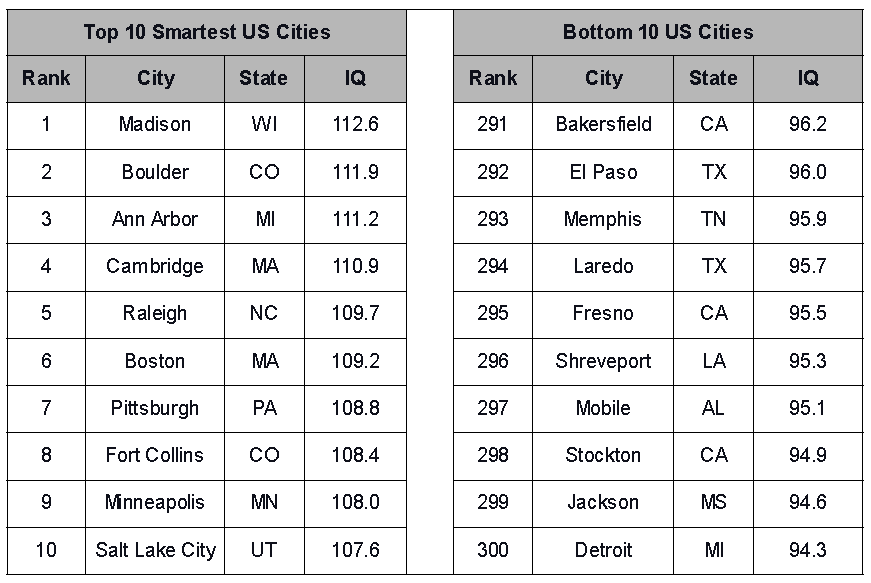New research highlights how cognitive ability varies from city to city across the US, challenging familiar assumptions.
A new data-driven ranking from CerebrumIQ has disrupted conventional wisdom about intellectual hotspots in the US, revealing that the smartest cities in the US are not necessarily the largest or wealthiest. Drawing on anonymized data from over 100,000 US-based users, the analysis sheds light on how people reason, make decisions, and solve problems under cognitive pressure.
IQ scores were calculated on the CerebrumIQ.com platform across five core cognitive skills: visual perception, abstract reasoning, pattern recognition, spatial orientation, and analytical thinking. Data from 300 US cities was anonymized and mapped to identify regional mental performance patterns.
IQ scores were calculated on the CerebrumIQ.com platform across five core cognitive skills: visual perception, abstract reasoning, pattern recognition, spatial orientation, and analytical thinking. Data from 300 US cities was anonymized and mapped to identify regional mental performance patterns.

Madison (WI), Boulder (CO), and Ann Arbor (MI) ranked among the top performers, consistently surpassing major metros like Los Angeles, Houston, and even New York in average IQ. People often assume intelligence depends on capital and city size, but intellectual ability is not a luxury of wealth. Instead, cities with strong academic ecosystems and public investment in mental development, often mid-sized and university-centred, emerge as leaders. In some cases, it simply reflects how well a city supports brain-healthy environments.
The bottom of the ranking includes cities like Detroit (MI), Jackson (MS), and Stockton (CA), with average IQs below 95. This contrast challenges assumptions that larger populations equate to more intellectual capital.
Contrary to tech-industry stereotypes, West Coast cities did not dominate the upper tiers. Instead, cities in the Midwest and Mountain West showed strong average performance. The research attributes this in part to local investment in education and slower-paced lifestyles that favour focus and mental resilience. The Northeast held steady, with both Cambridge and Boston (MA), as well as Pittsburgh (PA), ranking in the top ten.
This mental performance trend has significant implications for employers and policymakers. Cities that foster mental performance are far more likely to attract and retain talent, promote innovation, and improve educational outcomes. For recruiters, it offers a new perspective on talent distribution, demonstrating that cognitive strength extends beyond expensive metropolitan centres. Moreover, educators and local governments may find valuable insights into which analytical skills are lagging within their communities, with implications for public health, curriculum design, and digital literacy efforts.
CerebrumIQ is a cognitive performance platform designed to strengthen mental skills through a blend of IQ testing, neural training games, intelligence puzzles, educational courses, and expert content. The assessments are calibrated to reflect standard IQ tests and used globally to track and enhance users’ thinking abilities. The platform, used by over a million people worldwide, offers more than 300 lessons on emotional intelligence, problem-solving, innovation, confidence-building, and decision-making, helping users develop essential life skills in a structured, engaging way. CerebrumIQ is redefining how people engage with their mental potential. Unlike entertainment-style brain games, Cerebrum IQ is a structured training ecosystem built to deliver lasting neural growth.
Contact:
Amelia Botha
PR Manager
pr@cerebrumiq.com
https://cerebrumiq.com/
The bottom of the ranking includes cities like Detroit (MI), Jackson (MS), and Stockton (CA), with average IQs below 95. This contrast challenges assumptions that larger populations equate to more intellectual capital.
Contrary to tech-industry stereotypes, West Coast cities did not dominate the upper tiers. Instead, cities in the Midwest and Mountain West showed strong average performance. The research attributes this in part to local investment in education and slower-paced lifestyles that favour focus and mental resilience. The Northeast held steady, with both Cambridge and Boston (MA), as well as Pittsburgh (PA), ranking in the top ten.
This mental performance trend has significant implications for employers and policymakers. Cities that foster mental performance are far more likely to attract and retain talent, promote innovation, and improve educational outcomes. For recruiters, it offers a new perspective on talent distribution, demonstrating that cognitive strength extends beyond expensive metropolitan centres. Moreover, educators and local governments may find valuable insights into which analytical skills are lagging within their communities, with implications for public health, curriculum design, and digital literacy efforts.
CerebrumIQ is a cognitive performance platform designed to strengthen mental skills through a blend of IQ testing, neural training games, intelligence puzzles, educational courses, and expert content. The assessments are calibrated to reflect standard IQ tests and used globally to track and enhance users’ thinking abilities. The platform, used by over a million people worldwide, offers more than 300 lessons on emotional intelligence, problem-solving, innovation, confidence-building, and decision-making, helping users develop essential life skills in a structured, engaging way. CerebrumIQ is redefining how people engage with their mental potential. Unlike entertainment-style brain games, Cerebrum IQ is a structured training ecosystem built to deliver lasting neural growth.
Contact:
Amelia Botha
PR Manager
pr@cerebrumiq.com
https://cerebrumiq.com/